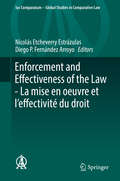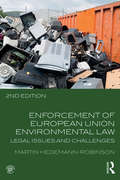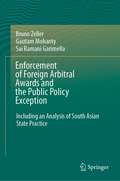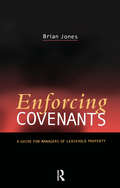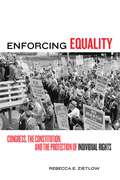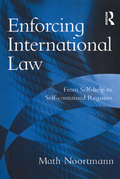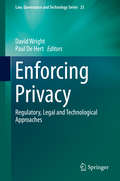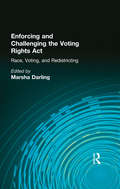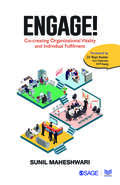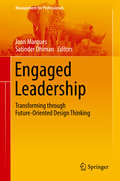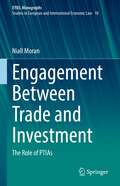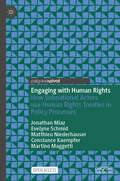- Table View
- List View
Enforcement and Effectiveness of the Law - La mise en oeuvre et l’effectivité du droit: General Contributions of the Montevideo Thematic Congress - Contributions générales du Congrès thématique de Montevideo (Ius Comparatum - Global Studies in Comparative Law #30)
by Nicolás Etcheverry Estrázulas Diego P. Fernández ArroyoThis book gathers the general contributions to the 3rd Thematic Congress of the International Academy of Comparative Law, which took place from 16 to 18 November 2016 in Montevideo, Uruguay. The main topic of the Congress was the enforcement and effectiveness of the law as a particularly relevant concern in today’s society, in which the expressions of law have multiplied and legal pluralism seems to have reached its peak.The book addresses the enforcement of constitutional rights in national and supranational contexts, as well as the effectiveness of international dispute settlement. Further, it examines in detail the relations between the enforcement and effectiveness of criminal law, contract law and family law.Ce livre rassemble les contributions générales du 3ème Congrès thématique de l'Académie internationale de droit comparé, qui s'est déroulé du 16 au 18 novembre 2016 à Montevideo en Uruguay. Le sujet principal du Congrès était la mise en oeuvre et l’effectivité du droit qui constituent une préoccupation particulièrement pertinente dans la société contemporaine où les expressions du droit se sont multipliées et où le pluralisme juridique semble avoir atteint son apogée. Le livre traite de la mise en oeuvre des droits constitutionnels dans des contextes nationaux et supranationaux ainsi que de l'efficacité du règlement des différends internationaux. En outre, il examine en détail les relations entre l'application et l'efficacité du droit pénal, du droit des contrats et du droit de la famille.
Enforcement at the EPA: High Stakes and Hard Choices, Revised Edition
by Joel A. MintzA former EPA chief attorney traces the tumultuous history of the agency&’s enforcement efforts from the Nixon through the second Bush administrations. Based on 190 personal interviews with present and former enforcement officials at EPA, the U.S. Department of Justice, and key congressional staff members—along with extensive research among EPA documents and secondary sources—this book vividly recounts the often-tumultuous history of EPA&’s enforcement program. It also analyzes some important questions regarding EPA&’s institutional relationships and the Agency&’s working environment. This revised and updated edition adds substantial new chapters examining EPA enforcement during the Clinton and George W. Bush administrations. Its treatment of issues of civil service decline and the applicability of captive agency theory is also new and original. The first published work to treat the historical evolution of EPA enforcement, this book provides a candid inside glimpse of a crucial aspect of the work of an important federal agency. &“Explores the agency&’s strengths and weaknesses . . . With insight and intimate knowledge of enforcement and compliance, Mintz relates an interesting story.&” —Ecology Law Quarterly
Enforcement of Corporate and Securities Law: China and the World
by Huang Robin Hui Howson Nicholas CalcinaThis book is the first of its kind in focusing on the enforcement of corporate and securities laws, both public and private, a relatively understudied but critically important issue for the development and health of global capital markets. The book has a special focus on the young system coming into being in the People's Republic of China (PRC), but also examines the enforcement of corporate and securities laws across the globe and across different legal and political systems from an in-depth comparative perspective. This single volume assembles a veritable 'dream team' of contributors who are amongst the very best scholars and legal specialists in the many national jurisdictions covered in the book. Hence, it is of significant value to corporate and securities regulators, judicial officials, prosecutors, litigation specialists, corporate counsel, legal and economic policymakers, scholars, think tanks, students, and investors alike.
Enforcement of European Union Environmental Law: Legal Issues and Challenges
by Martin Hedemann-RobinsonOffering a detailed account of the various legal arrangements at European Union level, this book is an ideal reference tool for practitioners and legal scholars. As well as examining the principal sources of EU environmental law enforcement, it also contributes to the legal and political debates that surround the subject. Spanning three parts, the author examines the practical impact of the legal arrangements at Union level that are used to uphold EU environmental norms. Offering a comprehensive account of the current state of EU environmental law enforcement and the developments affecting it, Martin Hedemann-Robinson explores the role of the European Commission, the possibilities for private law enforcement, and the responsibilities of member state national authorities. Key legal developments that have occurred since the first edition have been incorporated, including new statutory developments and case law. Particular attention is paid to the impact of the 2007 Lisbon Treaty on foundational EU treaty provisions enabling the European Commission to take legal action against EU member states infringing Union environmental law, the establishment of a new legal architecture at Union level on the topic of environmental criminal policy, as well as increased EU legislative intervention in the area of environmental inspections. The impact of the 1998 Århus Convention on EU environmental law enforcement is also addressed in detail, including the influence of recommendations of the Århus Convention’s Compliance Committee.
Enforcement of Foreign Arbitral Awards and the Public Policy Exception: Including an Analysis of South Asian State Practice
by Sai Ramani Garimella Bruno Zeller Gautam MohantyThe book presents arguments derived from primary sources related to international arbitration in South Asian jurisdictions, a list of the same is made available therein. The book is a research statement on the contemporary concerns within international commercial arbitration, especially related to enforcement of foreign arbitral awards. Importantly, the book through a unique methodology of interface, presents the gratuitous nature of Article 34 of the UNCITRAL Model Law when read with Article V of the New York Convention, especially the plea to the States within Article VII of the same Convention to ease the restrictions and the process of enforceability of foreign arbitral awards. The book also articulates another important and immediate need with regard to international arbitration – the delimitation of public policy exception to recognition and enforcement of foreign arbitral awards. It critiques the jurisprudence related to arbitration in jurisdictions spread across different geographic regions, thereby enabling the reader to gain an insight into their practices, apart from ensuring a comparative perspective. The book addresses the primary concern related to international arbitration – enforcement of foreign arbitral awards and the grounds for challenges articulated within the New York Convention and the UNCITRAL Model Law. It addresses these grounds, and articulates the necessity for carving the criteria for the application of public policy exception. The book will not only be a useful resource for policy makers, students and researchers interested in international commercial arbitration, and private international law, but also for practitioners working on dispute resolution in trans-jurisdictional disputes in South Asia and beyond.“…The present book is not just another book contributing to the endless list of literature already widely used in International Commercial Arbitration on public policy but, in my opinion, is unique in many respects. The distinguishing factor of this book is its regional perspective…" - Justice Deepak Verma, Former Judge of Supreme Court of India and Arbitrator“…This book addresses this core element of the success story of arbitration: enforcement and refusal to enforce and, hence, its relevance cannot be overstated…” - Csongor István Nagy, Professor of Law and Head, Department of Private International Law, University of Szeged, Hungary Detailed Forewords are available in the book and can be freely downloaded from https://link.springer.com/book/10.1007/978-981-16-2634-0
Enforcement of International Environmental Law: Challenges and Responses at the International Level (Routledge Research in International Environmental Law)
by Martin Hedemann-RobinsonThe international community has generated several hundred multilateral environmental agreements, yet it has been far less successful in developing means to ensure that contracting parties honour them in practice. The subject of law enforcement has traditionally attracted relatively little attention amongst international policy-makers at the formation stage of a multilateral environmental accord. Commonly, the question of how to secure collective adherence to environmental treaty regimes might well only be considered in depth at a much later stage of an environmental agreement’s evolution, if at all. At the same time, the significance of the issue of enforcement has gradually received more considered attention by states and international institutions. Providing an analysis of the nature, extent and current state of the international legal framework concerned with enhancing effective implementation of international environmental law, this book considers the scope and impact of international rules of law whose remit is to require or promote compliance by states with their international environmental legal obligations.
Enforcement of Maritime Claims (Lloyd's Shipping Law Library)
by David JacksonThe fourth edition consists of consideration of all aspects of the jurisdiction of English courts and arbitrators over maritime claims, applicable law, judgments, remedies and security interests, including the continuing critical impact of membership of the European Union. The comprehensive updating encompasses legislative, convention and judicial developments since the publication of the last edition in 2000 – in particular the replacement of the amended Brussels Jurisdiction and Judgments Convention 1968 by Council Regulation 44/2001 and its effect on other maritime convention jurisdiction provisions, relevant Civil Procedure Rules and judicial interpretation of both.
Enforcing Covenants
by Brian JonesEnforcing Covenants focuses on the measures which managers of residential leasehold property can deploy to encourage leaseholders and other parties to abide by their contractual obligations with a view to achieving the most effective management of their estates and developments. In particular, the book concentrates on the changes to the law introduced by the Commonhold and Leasehold Reform Act 2002. Enforcing obligations in leases has never been easy, and the 2002 Act has made it even more onerous for the hard pressed property manager. Very few will be able to avoid having to take enforcement action, especially when bringing in the funds to make management feasible. Subjects examined in this book include: the new rules on forfeiture the new rules on ground rents service charge recovery enforcing county court judgments the new procedures and jurisdictions of the Leasehold Valuation Tribunals enforcing repairs neighbour disputes and nuisance cases injunctions and specific performance costs and administration charges alternative dispute resolution. Enforcing Covenants is essential reading for anyone involved in the management of property, whether they be professionals or lay directors of residents management companies. As well as examining the relevant law and decisions of the Leasehold Valuation Tribunals, the book provides much practical guidance on rules and procedures, illustrated by precedent forms and notices and backed up by some light-hearted case studies.
Enforcing Ecocide: Power, Policing & Planetary Militarization
by Alexander Dunlap Andrea BrockPolicing and ecological crises – and all the inequalities, discrimination, and violence they entail – are pressing contemporary problems. Ecological degradation, biodiversity loss, and climate change threaten local communities and ecosystems, and, cumulatively, the planet as a whole. Police brutality, wars, paramilitarism, private security operations, and securitization more widely impact people – especially people of colour – and habitats. This edited collection explores their relationship, and investigates the numerous ways in which police, security, and military forces intersect with, reinforce, and facilitate ecological and climate catastrophe. Employing a case study-based approach, the book examines the relationships and entanglements between policing and ecosystems, revealing the intimate connection between political violence and ecological degradation.
Enforcing Equality: Congress, the Constitution, and the Protection of Individual Rights
by Rebecca E ZietlowIn Enforcing Equality, Rebecca E. Zietlow assesses Congress's historical role in interpreting the Constitution and protecting the individual rights of citizens, provocatively challenging conventional wisdom that courts, not legislatures, are best suited for this role.Specifically focusing on what she calls “rights of belonging”—a set of positive entitlements that are necessary to ensure inclusion, participation, and equal membership in diverse communities—Zietlow examines three historical eras: Reconstruction, the New Deal era, and Civil Rights era of the 1960s. She reveals that in these key periods when rights of belonging were contested and defined, Congress has played the role of protector of rights at least as often as the Supreme Court has adopted this role. Enforcing Equality also engages in a sophisticated theoretical analysis of Congress as a protector of rights, comparing the institutional strengths and weaknesses of Congress and the courts as protectors of the rights of belonging.With the recent new appointments to the Supreme Court and Congressional elections in November 2006, this timely book argues that individual rights are best enforced by the political process because they express the values of our national community, and as such, litigation is no substitute for collective political action.
Enforcing Immigration Law at the State and Local Levels
by Don Prosnitz Jessica Saunders Nelson LimAlmost 12 million out-of-status aliens currently reside in the United States. The federal government does not require state and local agencies to carry out specific immigration enforcement actions; however, comprehensive immigration reform may do so in the near future. This paper describes variations in enforcement approaches and making their pros and cons more explicit.
Enforcing Intellectual Property Rights: A Concise Guide for Businesses, Innovative and Creative Individuals
by Jane LambertWhat do you do if ... you need to seek a court order against a former employee who has set up in competition with you, having first helped themselves to your customer database? ... Or if you are deluged with complainants who have bought products they thought were yours, but turn out to have been made from inferior materials and without your knowledge or consent? ... Or if you receive a solicitor's letter complaining that a product you are about to launch infringes their client's trade mark or registered design? Jane Lambert's concise and practical guide gives you the knowledge that you need to make crucial decisions to protect your intellectual assets before it is too late. It should be kept close at hand for use in emergencies, just like a first aid manual. Its purpose is to alert you to problems so that you can take the right steps to manage them, in consultation with your professional advisors, before they develop into crises. And, if the worst does happen and you need to go to law, the guide provides you with the information you need to understand the process, the risks and how to prepare effectively. If you are planning an enforcement strategy, looking for the optimum patent or registered trade mark or design protection and to secure the appropriate insurance to make sure you have a fund available to enforce these, then this book is for you. If you're already in hot water, someone with an intellectual property problem who needs to make fast decisions in very little time, then this book is for you too. It could help you avoid the most expensive mistake of your life.
Enforcing International Humanitarian Law via Individual Rights: The Role of Strategic Litigation in Germany
by Vera StrobelThis book centres on the contribution of strategic litigation to the enforcement of international humanitarian law (IHL) with regard to armed conflicts around the world. It examines the instrument of strategic litigation as a vehicle for access to justice and scrutinizes its possibilities and challenges for enforcing compliance with IHL in Germany. In particular, the novel approach of connecting IHL duties set out to protect civilians with individual rights claims and the increased presence of such arguments in strategic cases before domestic courts is analysed. The monograph first provides a general introduction to the term of strategic litigation, its actors and approaches. It then explores the framework for access to justice in Germany and beyond as well as important past and current strategic cases. Further, the crucial impacts as well as raised concerns and key potentials of such cases are discussed. Two detailed case studies are undertaken of the landmark proceedings before German courts in the Ramstein drone case with plaintiffs from Yemen and in the case on the Kunduz (Afghanistan) air strike. These case studies scrutinize the procedural avenues, the legal arguments, the resulting court decisions, the strategic litigation context, and the important impact of the proceedings. The work contributes significant and novel findings to the literature on IHL, human and fundamental rights and strategic litigation. Next to a primary research audience, the book's findings are highly relevant for IHL practitioners, individual and collective actors in strategic litigation, NGOs, courts and governments. Vera Strobel is a researcher at the Chair of Professor Dr. Thilo Marauhn in Public Law and International Law at the Justus-Liebig University in Gießen, Germany.
Enforcing International Law: From Self-help to Self-contained Regimes
by Math NoortmannUntil recently, the fundamental link between two basic concepts in international law, namely the right to self-help and the obligation to settle disputes by peaceful means, has been neglected in doctrine and practice. The main issue is that international law traditionally recognizes the right of states to safeguard their own rights by resorting to countermeasures as well as the obligation to settle their disputes by accepted and recognized diplomatic and judicial procedures. Both concepts are based on their own merits, which are assumed to be valid in contemporary international law. It is the primary purpose of this study to determine which rules and principles govern the relationship between the two concepts. The book's major findings arise from an analysis of scholarly work, supported by examples from five different case studies. Drawing insights from legal as well as political science, it will be a valuable resource for students, academics and policy makers in international law, international relations and related areas.
Enforcing Privacy
by David Wright Paul De HertThis book is about enforcing privacy and data protection. It demonstrates different approaches - regulatory, legal and technological - to enforcing privacy. If regulators do not enforce laws or regulations or codes or do not have the resources, political support or wherewithal to enforce them, they effectively eviscerate and make meaningless such laws or regulations or codes, no matter how laudable or well-intentioned. In some cases, however, the mere existence of such laws or regulations, combined with a credible threat to invoke them, is sufficient for regulatory purposes. But the threat has to be credible. As some of the authors in this book make clear - it is a theme that runs throughout this book - "carrots" and "soft law" need to be backed up by "sticks" and "hard law". The authors of this book view privacy enforcement as an activity that goes beyond regulatory enforcement, however. In some sense, enforcing privacy is a task that befalls to all of us. Privacy advocates and members of the public can play an important role in combatting the continuing intrusions upon privacy by governments, intelligence agencies and big companies. Contributors to this book - including regulators, privacy advocates, academics, SMEs, a Member of the European Parliament, lawyers and a technology researcher - share their views in the one and only book on Enforcing Privacy.
Enforcing and Challenging the Voting Rights Act: Race, Voting, and Redistricting (Controversies in Constitutional Law #2)
by Marsha DarlingFirst Published in 2002. Routledge is an imprint of Taylor & Francis, an informa company.
Enforcing the Equal Protection Clause: Congressional Power, Judicial Doctrine, and Constitutional Law
by William D. AraizaFor over a century, Congress’s power to enforce the Fourteenth Amendment’s guarantee of “the equal protection of the laws” has presented judges and scholars with a puzzle. What does it mean for Congress to “enforce” such a wide-ranging, open-ended provision when the Supreme Court has insisted on its own superiority in interpreting the Fourteenth Amendment? In Enforcing the Equal Protection Clause, William D. Araiza offers a unique understanding of Congress’s enforcement power and its relationship to the Court’s claim to supremacy when interpreting the Constitution.Drawing on the history of American thinking about equality in the decades before and after the Civil War, Araiza argues that congressional enforcement and judicial supremacy can co-exist, but only if the Court limits its role to ensuring that enforcement legislation reasonably promotes the core meaning of the Equal Protection Clause. Much of the Court’s equal protection jurisprudence stops short of stating such core meaning, thus leaving Congress free (subject to appropriate judicial checks) to enforce the full scope of the constitutional guarantee. Araiza’s thesis reconciles the Supreme Court’s ultimate role in interpreting the Constitution with Congress’s superior capacity to transform the Fourteenth Amendment’s majestic principles into living reality.The Fourteenth Amendment’s Enforcement Clause raises difficult issues of separation of powers, federalism, and constitutional rights. Araiza illuminates each of these in this scholarly, timely work that is both intellectually rigorous but also accessible to non-specialist readers.
Engage!: Co-creating Organizational Vitality and Individual Fulfilment
by Sunil MaheshwariThe salient organizational development challenge in modern times is that of building a highly engaged workforce that is committed, productive and innovative. Employees wish to give their very best at work. Organizations also make every effort to provide an atmosphere where people can do their best. However, despite intensive efforts from both sides, engagement still remains elusive. This book emphasizes the role that the employee and the institution need to play, in order to make people engagement possible. It spells out a novel engagement paradigm that starts from the fundamentals i.e. the intrinsic nature of the human being and the basic nature of organizational work in modern society. The text goes on to identify an appreciative culture and a holistic structure as the two foundational pillars that support people engagement in organizations. The engagement capabilities that are required for fulfilling the responsibilities at each organizational level are then articulated in great detail. Through numerous originally developed process frameworks, accompanied by several comprehensive organizational case studies drawn from across the world, the book illustrates how people engagement actually happens in practice. The goal is to show how organizational vitality may be seamlessly created alongside individual fulfillment.
Engaged Leadership: Transforming Through Future Oriented Design Thinking (Management For Professionals)
by Satinder Dhiman Joan MarquesThis professional book examines the concept of engaged leadership. Specifically, it focuses on the need for leaders in personal and professional realms, for-profit and non-profit, to understand the importance of engagement in order to achieve enhanced satisfaction and motivation among stakeholders (including employees, shareholders, investors, supporters, customers, suppliers, the community, competitors, family, and partners), and hence, an augmented level of designed thinking, which leads to increased innovation and on-going leadership development. Divided into three sections—engaged leadership development at the personal level, implementation at the organizational level, and manifestation in practice—this book provides professionals, practitioners and policy makers as well as students with the tools and skills to lead actively and conscientiously and help them understand the importance of creativity and compassion for development. Engaged leadership operates on the fundamental principle that leaders have to first and foremost perceive themselves as leaders, and then engage in design thinking, as they will need to develop strategies to reach, encourage, and positively appeal to these stakeholder groups. Leadership is neither limited to those holding formal managerial position, nor to any particular setting. Leaders can be found everywhere, in all layers of society. Leadership is only possible, however, if one dares to perceive and define oneself as a leader. And only when leadership is adopted as a reality within one’s personal perception, can engaged leadership be applied. Featuring contributions from academics, scholars, and professionals from around the world, each providing cases, interactive questions and reflective notes, this book will be of interest to professionals, practitioners, policy makers, students and scholars interested in creative leadership, management, organizational behavior, and governance.
Engagement Between Trade and Investment: The Role of PTIAs (European Yearbook of International Economic Law #18)
by Niall MoranThis book explores engagement between the trade and investment law regimes and the extent to which this is being driven by Preferential Trade and Investment Agreements (PTIAs). It provides an empirical analysis of engagement between the two regimes using data from 60 PTIAs and 60 Bilateral Investment Treaties concluded between 2005-2019 to see whether PTIAs result in increased engagement and whether they are doing so over time. The book explores eight of the factors identified as evidencing inter-regime engagement. These chapters look at when engagement is appropriate and to what extent it is appropriate in relation to each of these areas. Based on the findings of this book’s empirical and comparative law analysis of PTIAs, BITs, and the trade and investment law regimes, the book examines whether the conclusion of PTIAs compared to BITs has resulted in increased levels of engagement between the trade and investment law regimes.This book does not put forth the view that convergence between trade and investment is always appropriate, but provides recommendations as to how treaties may be formulated and interpreted in a manner that takes inter-regime engagement into account with a view to ensuring the harmonious simultaneous development of the two regimes. The question of the future direction for engagement between the trade regime and the investment regime is very topical in light of changes to the architecture of both regimes at present.
Engaging Evil: A Moral Anthropology (Methodology & History in Anthropology #36)
by William C. Olsen Thomas J. CsordasAnthropologists have expressed wariness about the concept of evil even in discussions of morality and ethics, in part because the concept carries its own cultural baggage and theological implications in Euro-American societies. Addressing the problem of evil as a distinctly human phenomenon and a category of ethnographic analysis, this volume shows the usefulness of engaging evil as a descriptor of empirical reality where concepts such as violence, criminality, and hatred fall short of capturing the darkest side of human existence.
Engaging With Stakeholders: A Relational Perspective on Responsible Business
by Adam Lindgreen Joelle Vanhamme Francois Maon Beatriz Palacios Florencio Carolyn Strong Christine VallasterEngaging with Stakeholders: A Relational Perspective on Responsible Business contends that meaningful and constructive stakeholder engagement efforts should be rooted in a deep relational process of shared understanding, expectations, and viewpoints, through honest, continued dialogue between stakeholders and company management. This anthology follows and reaffirms this view, which also establishes the increasing need to explore the subtleties of how companies can respectfully engage their stakeholders in ways that reflect the corporate strategy and contribute to the ongoing development of business activities and creation of value, for themselves and stakeholders, from social, environmental, and economic perspectives. Stakeholder engagement practices, however, remain highly complex and difficult to manage; their ability to generate value in an inclusive way requires critical consideration. Sound stakeholder engagement efforts also constitute a keystone for responsible business activities. Drawing on a wide range of literature and studies, this book addresses key dimensions of stakeholder engagement, through a responsible business lens, and thereby contributes to identifying the opportunities, challenges, and key organizational implications associated with their unfolding. The four main topics covered are: • Delineating the nature and multiple raisons d’être of stakeholder engagement • Dialogical and communicational foundations of stakeholder engagement • Engaging with diverse stakeholders throughout the value chain • Reaping organizational returns and relational rewards of stakeholder engagement efforts
Engaging the Heart in Business: A Revolutionary Market Approach Based On Love (Giving Voice to Values)
by Alice Alessandri Alberto AleoIn the wake of the profound upheavals that our society has been facing, the business world is undergoing change. Values such as trust, well-being, sustainability, and respect for human beings and their deeper ambitions are becoming increasingly important. Corporations and professionals can achieve and maintain success only if they can bring their relationship with their customers to a new, higher level. The condition that links the two is very similar to that created when we fall in love. The organizational models and marketing approaches based on the metaphor of war, and the inherent rhetoric of "command and control", are no longer valid; to form such a bond we need love. The authors are aware of this. Since 2013, in collaboration with international scholars, they have been studying the new market dynamics and the fundamental role of ethics in gaining commercial results. While their previous book Sales Ethics (2015) helped to set up and manage customer relationships based on trust and fairness, this new book will support you in building your business strategy and designing marketing tools (from customer analysis, to the definition of your offer and the style of communication, up to the positioning of prices and the management of resources) in the light of a new model, the Loving Business Model, which aims to make the customer fall in love with you, and you with your work. This book, like its predecessor, is the result of independent research conducted between Italy and the United States combined with the authors’ many years of professional experience. It contains the most up-to-date and effective techniques available in the modern marketing landscape, supported by case studies, concrete examples and activities, which will guide you to put your newly acquired knowledge into practice.
Engaging with Human Rights: How Subnational Actors use Human Rights Treaties in Policy Processes (Palgrave Socio-Legal Studies)
by Martino Maggetti Evelyne Schmid Jonathan Miaz Matthieu Niederhauser Constance KaempferMaking human rights a reality requires that various types of domestic actors take measures, which is often demanding, all the more so in federal systems. This open access book, Engaging with Human Rights: How Subnational Actors use Human Rights Treaties in Policy Processes, shows that an important part is played at the subnational level, with repeated back-and-forth between and within levels of governance rather than a ‘top-down’ trajectory. The dynamics of implementation at national and sub-national level is an emerging area of study. This book explores how actors use human rights treaties in the policy process, sometimes leading to an engagement that increases human rights implementation, and at other times not. Treaties provide both opportunities and constraints. Switzerland, as a highly decentralized federal state, offers a perfect setting to study the processes at work. Using legal, political, and sociological analyses, the authors draw on over 65 semi-structured interviews and focusses on two topical case studies: violence against women, including domestic violence, and the rights of persons with disabilities. This book provides a blueprint for other researchers and practitioners who wish to study the concrete implementation and impacts of human rights obligations.
Engineering Analysis of Fires and Explosions
by Randall K. NoonEngineering Analysis of Fires and Explosions demonstrates how professional forensic engineers apply basic concepts and principles from engineering and scientific disciplines to analyze fires and explosions. It describes how forensic engineers use a "reverse design" process to determine the original cause of a fire or explosion. This guide incorporates practices and lessons learned from the first-hand experiences of the author and his colleagues. It is an exciting introduction to the multidisciplinary subject of fire and explosion analysis and its legal ramifications. The author's straightforward language and style make the concepts easy to understand.
